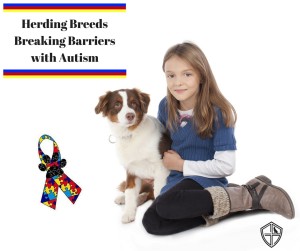Herding Breeds Breaking Barriers with Autism

We’re all familiar with service dogs – they’ve been around for quite a while. But did you know that dogs are now being trained to aid families with autistic children? And herding dogs have just the right temperament and instincts to fit the bill.
No one knows exactly what causes autism, but it affects about one in every 150 children. Characterized by a developmental disability, it can be especially hard for families to handle when their toddlers suddenly withdraw into their own bubble. It often becomes difficult for them to communicate and socialize with others – making the right dog a godsend.
Many autistic kids have a tendency to wander, so the presence of a dog – especially one born with the instinct to herd – can make the whole family feel much more comfortable. Plus, many kids enjoy being with their pup so much that they’re not even interested in wandering off. And if they do wander, the dog is there to find them - and entice them to return.
One Ohio mom says her biggest concern was that if her son ran off, he wouldn’t even be able to tell someone his name. So they rarely left home. Now, after two years with their service dog, the family has a new lease on life. That’s why herding dogs are the perfect match. Their general inclination to “herd” makes them a natural to keep the child close to their parents or a designated area. Going out in public is so much easier, and something the family may not have been able to do B.C. (before canine).
A recent pet therapy study found that a canine companion also helps autistic children express their feelings better. Personality (the dog’s) is everything, and the perfect service dog is one that’s forgiving and people-oriented. They have that “all right by me” attitude.
Even at the steep price tag of about $12,000 for a trained autism service dog, most families feel it’s well worth it. One of the reasons for the high cost is that no two children with autism are the same - and autism affects the entire family, so the pup needs to be part of a team.
Dog training and placement can be quite a challenge because family expectations vary widely. Some people want a dog trained to track down a missing child. Others want a dog to help them simplify a family outing or calm an upset child. And sometimes it’s just about companionship. The beauty is this - an autism service dog doesn’t know that his child has a disability. The dog is just there, patient and accepting. They give the child a sense of belonging and security they may not have had before.
But for those that can’t afford a trained autism service dog, take heart. There is anecdotal evidence that even pet dogs can help autistic kids connect with their world. Amy, of Madison, Wisconsin, says that’s exactly what happened with her daughter Angela, who was diagnosed with autism. Angela loves learning anything she can about dogs and the family has two dogs that she adores. Kona is a miniature Australian Shepherd who joined the family when Angela was 13. She stands steady by Angela’s side while the girl takes her medication. The family’s other dog is an Aussie-Golden Retriever mix named Sammy that they rescued for his willingness to accept unlimited hugs. There’s an unspoken language that’s just there between them - a perfect match for both girl and dogs.
Trained service dog or pet, it’s clear that dogs can have a life-changing influence on kids with autism. There’s probably some scientific explanation for why these dogs make such a big impact. But for those who are lucky enough to experience the connection, it’s simply magic.
Article By:
Sue Sveum







